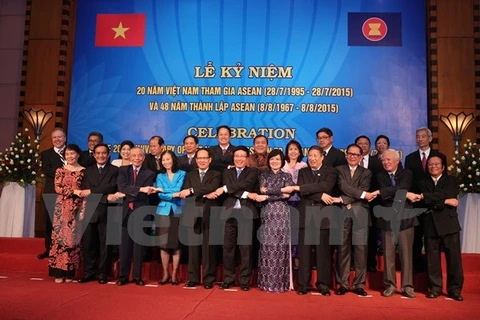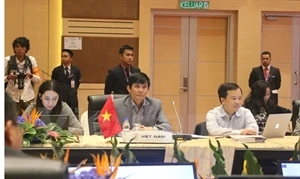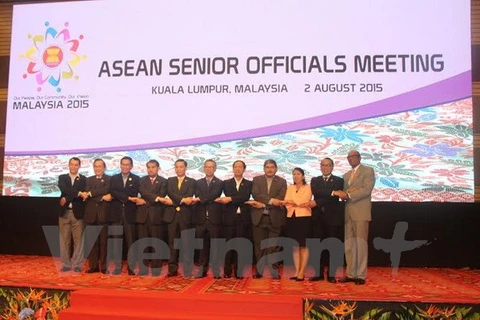The date July 28, 1995 marked an important integration milestone for Vietnam and went down in the history of the Association of Southeast Asian Nations (ASEAN) as the S-shaped country officially became the seventh member of the regional organisation that is now considered one of the world’s most dynamic groups. In the 20 years since, Vietnam has spared no efforts in joining other members to build and develop a “common ASEAN house”, and contributed greatly to its development policies, cooperation directions and major decisions.
In 1998, just three years after joining the bloc, Vietnam left a deep and strong impression in the heart of international friends when the country successfully hosted the 6th ASEAN Summit Meeting. The results of the meeting, especially the endorsement of the Hanoi Plan of Action (HPA) with a Vision to 2020, helped ASEAN maintain its long-lasting trend of solidarity and cooperation and consolidate its international position amidst a series of adverse impacts caused by the economic-financial crisis in 1997-1998. Vietnam also successfully undertook the rotating ASEAN Chairmanship in 2010 – a critical time in building the ASEAN Community.
Holding aloft the motto of “Solidarity is strength”, Vietnam actively pushed for the admission of Laos, Myanmar and Cambodia into ASEAN, thereby realising the idea of an association comprising all 10 Southeast Asian nations and ushering in a new historical chapter of solidarity, friendship and cooperation within the region. Following proposals on the pillars of Politics - Security Community and Economic Community put forth by Singapore and Indonesia, Vietnam suggested adding a third pillar of Socio-Cultural Community while building the ASEAN Community. Vietnam also made active contributions to working out relevant documents for the building of the ASEAN Community such as the Vientiane Action Programme 2004, the ASEAN Charter 2008 and the Roadmap for an ASEAN Community 2009-2015.
In parallel with efforts to beef up friendly and cooperative ties within the bloc, Vietnam has also been eager to accelerate the expansion of relations between the association and its outside partners through different forums and mechanisms such as ASEAN+1, ASEAN+3, East Asia Summit (EAS), ASEAN Regional Forum (ARF) and ASEAN Defence Ministers Meeting-Plus (ADMM+). At the 12th Shangri-La Dialogue (a regional security forum), organised in Singapore in May 2013, Vietnamese Prime Minister Nguyen Tan Dung called upon nations to prioritise building a “strategic trust” to foster long-lasting relations. Vietnam’s message was welcomed by the world, saying it was a breakthrough in the efforts to consolidate peace and create a favourable environment for cooperation, development and prosperity in the Asia-Pacific region.
Vietnam has consistently advocated a stance of ensuring security, safety and freedom of navigation and aviation in the East Sea. Hence, it has urged related parties to abide by the ASEAN – China Declaration on the Conduct of Parties in the East Sea (DOC) towards the formation of a Code of Conduct (COC) and settle territorial disputes through peaceful methods on the basis of observing the 1982 United Nations Convention on the Law of the Sea (UNCLOS).
In regard to economic – trade relations, joining ASEAN has enabled Vietnam to mix with a community of more than 600 million people, ranking seventh in the world in terms of combined gross domestic product (GDP). Being well aware of that role and responsibility, Vietnam has strictly enforced the ASEAN Economic Community (AEC)’s commitments with a performance rate between 85-95 percent, leading the bloc together with Singapore and Malaysia. Vietnam has also reduced import tariffs levied on more than 10,000 products to 0-5 percent in line with the ASEAN Trade in Goods Agreement (ATIGA).
In the first six months of 2015, Vietnam’s export earnings from other ASEAN markets reached 9.12 billion USD while its import value was estimated at 11.91 billion USD, representing a year-on-year increase of 5.3 percent. The import-export structure has changed positively with improvements seen in both quality and value, allowing Vietnam and other ASEAN members to join the world’s biggest exporters of rice, rubber, coffee, cashew nuts and garments.
Foreign direct investment (FDI) has been another bright spot in economic cooperation within the bloc. ASEAN has acted as a source of FDI as well as a bridge connecting multinational corporations to invest in Vietnam. By the end of June 2015, ASEAN member nations had 2,632 valid FDI projects in 55 out of Vietnam’s 63 provinces and cities with a combined investment capital of 54.6 billion USD.
The socio-cultural realm has also witnessed robust cooperation between Vietnam and other ASEAN members towards the target of a community with “unity in diversity”. In the current context of rapid globalisation, culture has been considered a useful bridge to enhance mutual understanding between nations and promote the friendship among the people of the ASEAN countries and between ASEAN and other regions across the globe. This guideline is very much in line with the Vietnamese Party and State’s viewpoint that “Culture plays the role of a spiritual foundation of the society, being both the goal of and momentum to accelerate socio-economic development.” Vietnam has more favourable conditions than ever to introduce its culture imbued with national identities to the Southeast Asian countries and acquire cultural essences from the region and the world. Vietnam has successfully hosted a wide range of major ASEAN cultural events and actively taken part in cultural activities in other member countries through the ASEAN Committee for Cultural and Information Cooperation.
The past 20 years have been full of all-around effort and profound hallmarks of Vietnam – a nation that has risen from various post-war difficulties and overcome rival blockages and embargoes to join with the regional countries to build a “common ASEAN house”. Despite expected challenges ahead, the Vietnamese people continue to trust in the bright future of an increasingly active ASEAN Community with “unity in diversity”.
By: Huy Hiep-Thu Hien


























